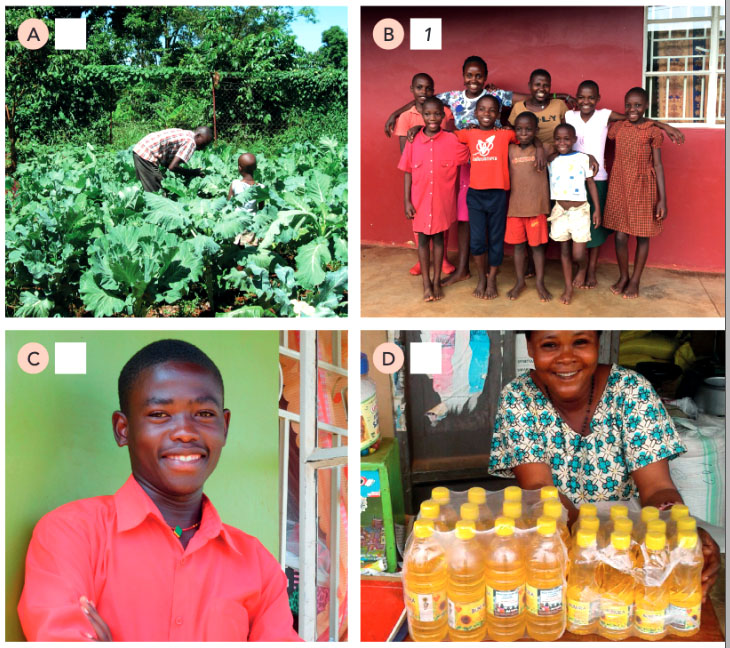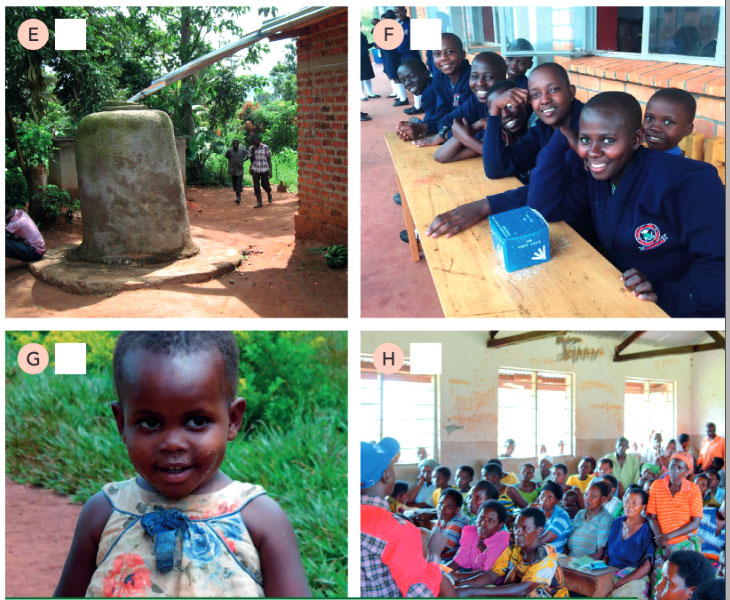Exercise 1
A. Listen to Part 1 of a show about the charity Adelante Africa. Answer the questions.
1 When was Adelante Africa started?
2 Why were the tourists in Uganda?
3 What happened to their truck in Igayaza?
4 What was the building where the tourists took shelter?
5 What condition was the building in?
6 What did one of the tourists do with the children?
7 What did the head teacher tell them they needed?
8 What did the tourists decide to do when they got home?
9 When did the new school open?
Answers
1 In 2008
2 They were on safari to see the mountain gorillas.
3 It broke down.
4 A primary school for orphans
5 It was in a terrible condition. The walls were falling down, the blackboards were broken, and there weren’t many desks.
6 She started teaching them English songs.
7 A new school
8 To set up a charity to raise money to rebuild the school
9 On 14 March 2010
Audioscripts
Part 1
The charity Adelante Africa was started in two thousand and eight. That summer, a group of Spanish and British tourists had travelled to Uganda on safari to see the mountain gorillas. Halfway through the trip, in a small rural village called Igayaza, the lorry they were travelling in broke down. While a mechanic repaired the lorry, the group took shelter in a nearby building. It was a primary school for orphans, children without parents, but it was in a terrible condition. The walls were falling down, the blackboards were broken, and there weren’t many desks. But the children were wonderful: very bright and friendly. One of the tourists was a primary school teacher, and she started teaching them English songs. She was amazed at how quickly they learned. When they left, they asked the head teacher how they could help, and he said, ‘What we need is a new school.’ When the tourists arrived home from their holiday, they decided to set up a charity to raise money to rebuild the school. Two years later, on the fourteenth of March twenty ten, the new school opened with seventy-five children – and since then, Adelante Africa hasn’t stopped.
B. Listen to Part 2, an interview with Jane Cadwallader, the secretary of Adelante Africa. Number the photos 1-8 in the order she mentions them.


C. Listen again and correct the information.
1 There are 47 children living in the children’s home.
2 People in Uganda eat a lot of vegetables.
3 They are building tanks to store petrol.
4 In the factory, they make palm oil.
5 In the FAL groups, children learn to read and write.
6 They have just built another primary school.
7 Most of the volunteers are from Europe.
8 John Muzzei is now studying to be a teacher.
9 When Rose first arrived at the children’s home, she never spoke.
Answers
B
2 A 3 E 4 D 5 H 6 F 7 C 8 G
C
1 There are 57 children living in the children’s home.
2 People in Uganda don’t eat (a lot of) vegetables / eat very few vegetables.
3 They are building tanks to collect rainwater.
4 In the factory, they make sunflower oil.
5 In the FAL groups, adults learn to read and write.
6 They have just built a secondary school.
7 Most of the volunteers are from Uganda.
8 John Muzzei is now studying to be a nurse.
9 When Rose first arrived at the children’s home, she never smiled.
Audioscripts
Part 2
I = interviewer, J = Jane
I I’m with Jane Cadwallader, the secretary of Adelante Africa.
J Hello.
I Hi Jane, how long have you been working with Adelante Africa?
J Well, for over ten years now. Since the beginning. I was the teacher who sang songs with the children back in two thousand and eight, when the lorry broke down.
I Jane, tell us what Adelante Africa has been doing since two thousand and ten, since the primary school was finished.
J Well, we’ve done a lot. Our next major project was to build a children’s home for the orphans who don’t have anybody in their extended family who can look after them. The children’s home has been running since two thousand and twelve, and now we have fifty-seven children there. But we also realized that if we wanted to help the local children, we really needed to help their parents, too. Our primary school was beautiful, but many of the children were sick, they had malaria or malnutrition. So we started several small community projects, for example we tried to help people to improve their diet by giving them seeds to plant a variety of vegetables. Most people in rural Uganda, you see, erm, don’t eat fruit and vegetables, except what they can find growing wild. We’ve also been building water tanks to collect rainwater, so that they have cleaner water to drink, and they don’t have to walk the long distances to the nearest river. And we’ve started a small factory to make sunflower oil, which has helped local farmers, and also given some jobs to local people. Sunflower oil is much healthier than the palm oil that most people were using before, so really we’ve helped the whole community with this.
I And are any of your new projects related to education?
J Absolutely. In two thousand and eleven we started a FAL group in Igayaza – FAL stands for Functional Adult Literacy, so these are classes to teach adults – mainly women – to read and write, and to speak English, which is the official language in Uganda. Since then, we’ve started eleven more FAL groups in other nearby villages. And our other big project is that we’ve just built a secondary school so that children from our primary school and the other local children can get a good secondary education. We’re very proud of it – it’s not quite finished yet, though. We need to raise more money in order to finish all the buildings.
I And are all the volunteers – the people who work with you – from Britain and Spain?
J No, not at all. There are a few of us from Europe who visit regularly, but the people who make it all possible are the Ugandan volunteers. Without them, we couldn’t do anything! In the future, we hope that all the projects will be run by them.
I And can you tell me about some of the children, some individual cases?
J Hmm, let me think. I know a good example. John Muzzei. He’s a boy, an orphan, who was at the primary school when the lorry broke down. He was very bright, and when he finished primary in the new school he got very good grades and we sponsored him to go to secondary school. He worked very hard there as well and did very well, and now he’s in the last year of nursing at a good nursing college. And I also have to tell you about Baby Rose. She was brought to our children’s home with her brother. They were living alone in a hut with their mother, who was dying of AIDS. When they arrived, Rose was a year old. She was suffering from malnutrition and weighed only five kilos. Her little legs were so thin that we thought she’d never walk. And she never, ever smiled. Now, one year later, she’s running around, laughing and smiling. Since she came here, she’s changed completely into a healthy, happy child.
I So Adelante Africa has really changed their lives?
J Yes, it’s changed their lives, but it’s also changed the lives of the people who work for Adelante Africa. Most of us feel it’s the most satisfying thing we’ve ever done. Have a look at the photos and videos on our website – it’s www.adelanteafrica.org. Maybe it will change your life, too.
Exercise 2
Listen and choose a, b, or c.
1 Philomena says that ____ potatoes cheer her up.
a roast or baked
b fried or roast
c boiled or baked
2 One kind of food Mark likes when he eats out is ____.
a Spanish
b Italian
c French
3 Ross has got on well with his stepbrothers and sisters ____.
a all his life
b since they grew up
c since they were teenagers
4 When Coleen won some money in the lottery, she spent it on ____.
a a long holiday
b a holiday abroad
c a short holiday
5 Richard raised ____ for Cancer Research.
a £6,000
b £6,500
c £6,050
Answers
1 a 2 b 3 b 4 c 5 b
Audioscripts
1
I = interviewer, P = Philomena
I What do you eat to cheer yourself up when you’re feeling sad?
P I love roast potatoes, baked potatoes. They’re warm, buttery, nice olive oil. They make me feel good.
I Does it make you feel better?
P Yeah, usually it does. I think they’re quite refreshing, warm. When you’re feeling down, I think they’re the perfect remedy.
2
I = interviewer, M = Mark
I How often do you eat out?
M Well, my wife would probably like me to eat out a little bit less, but probably about two to three times a week.
I What kind of places do you go to?
M You know, it always kind of depends. I think people like to eat in three or four different restaurants in their town no matter what, and it’s usually one of those three or four, usually pizza, Mexican, or Asian.
I Why do you like these kinds of restaurants?
M I guess part of it is it’s the type of food that you can’t normally prepare at home, so it’s something a little bit different. Otherwise it’s just tasty.
3
I = interviewer, R = Ross
I Do you have brothers and sisters?
R I have step brothers and sisters – two stepsisters and one stepbrother.
I Do you get on with them well?
R Yes, we didn’t grow up together, but we’re now all adults and we get on really well.
4
I = interviewer, C = Coleen
I Have you ever won any money, for example in a lottery?
C I won, many years ago, a thousand pounds, which was amazing.
I What did you do with it?
C We went on an unplanned long weekend break in the Malverns in England, which was absolutely gorgeous
5
I = interviewer, R = Richard
I Have you ever taken part in a charity event?
R I have, yes. I ran the London Marathon, I think about eight years ago now. For Cancer Research.
I How much money did you raise?
S About six and a half thousand pounds.
